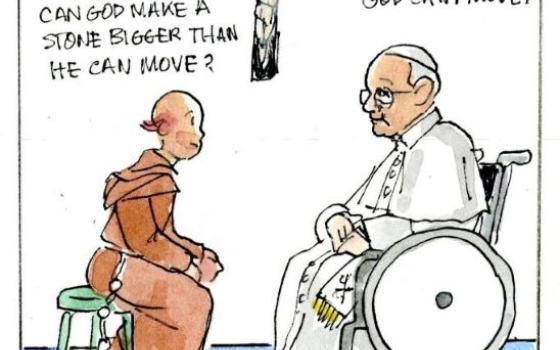By JOHN L. ALLEN JR.
London
In Rome, Pope Benedict XVI has not always been the luckiest of pontiffs. Just as he seemed to have put a controversy with Jews over a Good Friday prayer for conversion behind him, a cause célèbre over a Holocaust-denying bishop broke out; just as he seemed to be coming to grips with a mushrooming sex abuse crisis in Ireland, a fresh one in Germany exploded.
On the road, however, Benedict’s fortunes often improve dramatically.
His 2008 trip to France and his visit to the United Kingdom this week offer classic cases in point: In both cases, Benedict was venturing into thoroughly secular societies in which religion generally, and the pope specifically, are highly controversial. In both cases, pundits before the fact predicted the outing would end in disaster.
Yet also in both cases, Benedict got lucky in terms of the government waiting to receive him, because both French President Nicolas Sarkozy and the new British Prime Minister David Cameron are figures who have made religious voters an important part of their electoral base, and both are interested in rethinking secularism to make room for people and movements rooted in faith.
In other words, Benedict XVI happened to visit both of these potentially hostile territories at a moment when they were in friendly hands.
Sarkozy calls his vision “positive laïcité,” meaning a new approach to the traditionally strict church/state separation in France that offers religious believers a place at the table. Cameron, meanwhile, ran on his vision of the “Big Society,” which he’s defined as a “huge cultural change” in the U.K. in which people “don’t always turn to officials, local authorities or central government for answers to the problems they face, but instead feel both free and powerful enough to help themselves and their own communities.”
In practice, the payoff of that idea is that government should rely more on civil society, including people and movements rooted in religious convictions, to solve problems.
Thus as the 83-year-old Benedict warned Britain this week against an “aggressive secularism” threatening to “marginalize” Christianity, he’s found an unlikely ally in the 43-year-old Cameron, an Anglican and the youngest British Prime Minister in almost two hundred years.
All indications are that the message Benedict XVI came to the U.K. to deliver has been music in the ears of the Cameron government.
In remarks today in Birmingham, where Benedict XVI will beatify Cardinal John Henry Newman, Cameron is planning to thank the pontiff for compelling the British people to “sit up and think,” according to extracts of his speech provided to reporters.
“Faith is part of the fabric of our country. It always has been and it always will be,” Cameron will say, according to those extracts.
“As you, your Holiness, have said ... faith is not a problem for legislators to solve ... but rather a vital part of our national conversation. And we are proud of that,” Cameron will say.
In reality, a meeting of the minds between Cameron and Benedict should not be terribly surprising, given that the “Big Society” has a Catholic pedigree.
British Catholic commentator Austen Ivereigh points out that Cameron’s chief adviser is Philip Blond, an English political thinker and Anglican theologian associated with the "Red Tory" school of thought, which promotes a form of capitalism based on the "little guy" which its pioneers see as distinct from neo-liberalism.
In turn, Blond is close to the Anglican theologian and intellectual John Milbank, one of the pioneers of “Radical Orthodoxy,” an Anglo-Catholic theological movement intended to read distinctly post-modern concerns in the light of traditional Christian theology.
Benedict XVI has himself expressed curiosity and sympathy for the "Radical Orthodoxy" movement.
Ivereigh said that Blond is a regular at the annual Rimini gathering of Communion and Liberation, an influential Italian Catholic lay movement, and that recently Blond told the gathering that the thinking behind the “Big Society” had been influenced by attending the Rimini events.
Of course, politicians are notoriously fickle, and as Ivereigh concedes, the “Big Society” is so far a largely untested concept. It’s not clear how the Cameron government, which is also strongly committed to gay rights, might apply it to hard questions such as the right of Catholic adoption agencies to refuse to place children with same-sex couples.
Yet for the moment, Benedict XVI can at least go back to Rome confident that his message on the relationship between faith and reason found a receptive audience at 10 Downing Street. For that, he might count his lucky stars.
John Allen will be filing reports throughout the Papal visit to the U.K. Sept. 16-19. Stay tuned to NCR Today for updates.




